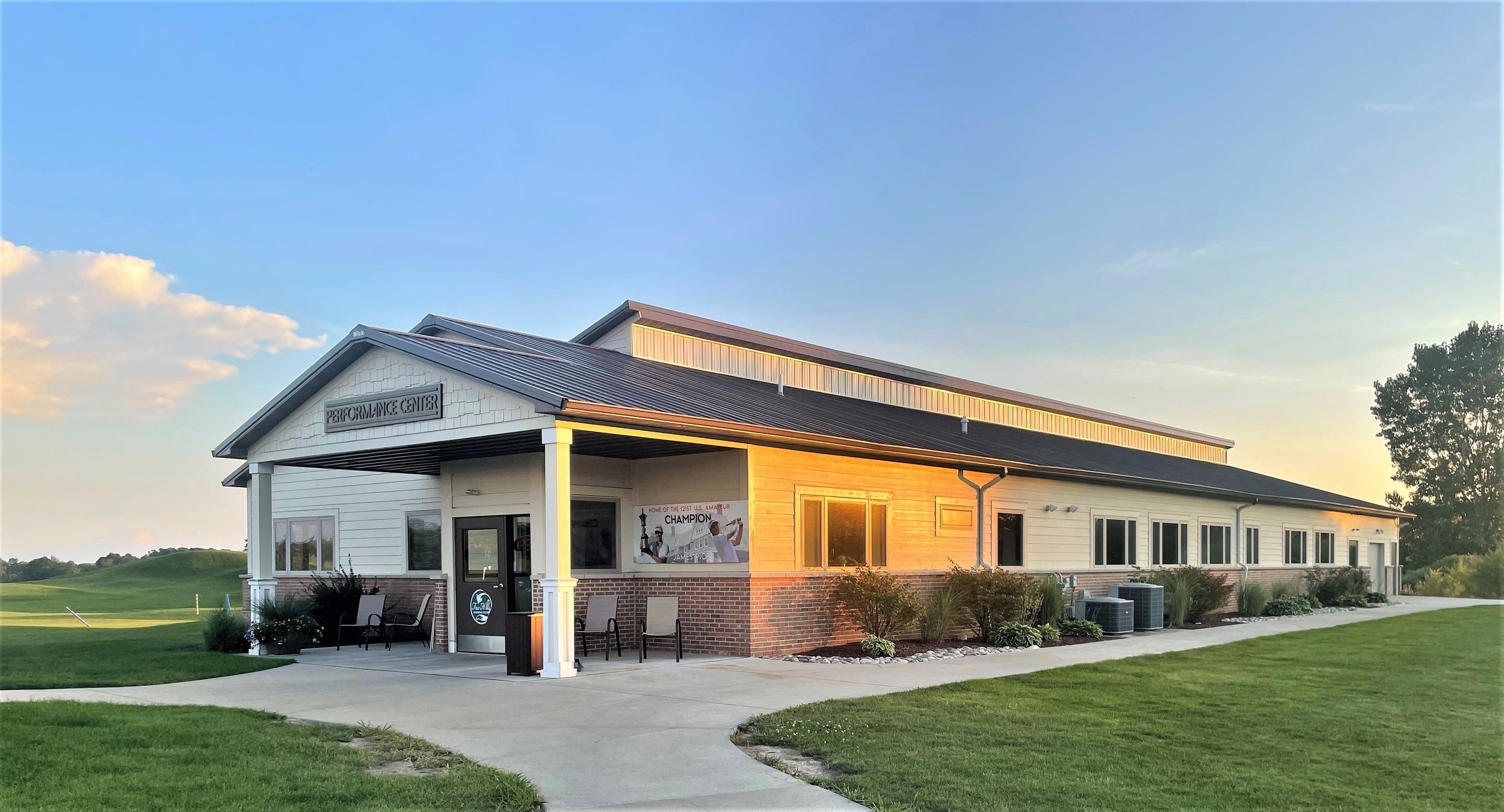Fox Hills: A Legacy Reborn
Sisters sell Fox Hills in Plymouth to Heritage Golf Group
By Tom Lang
Sisters Kathy Dul Aznavorian and Sandy Dul Mily never had grand visions of operating the largest and perhaps busiest golf facility in metro Detroit.
And now they no longer do, as retirement came calling.
After owning and managing Fox Hills Golf and Banquet Center as a family for nearly 50 years, building it piece by piece to its current full-blown glory, the pioneering sisters have sold Fox Hills Golf and Banquet Center to the Heritage Golf Group. Based in Arlington, VA, its portfolio includes a collection of nearly two dozen golf courses ranging from Illinois and now Michigan, to New Jersey, Virginia, Missouri, the Carolinas and Florida. We’ll get into more details on Heritage Golf Group’s plans in upcoming pages.
The Family Legacy:
Fox Hills began very small and intimate in its early days when Kathy and Sandy’s parents, Al and Estelle Dul, in 1974 purchased the former Fox Hills Country Club (est. 1927). Sandy, who had planned to go to nursing school, lived in a house that once stood near the original, still-used-today, log cabin clubhouse.
“I would literally stay in my home until I saw a golfer pull up,” Sandy told me several years ago in an early example of their bedrock principle of customer service. “I’d walk with him to the clubhouse, take his green fees, serve him his coffee. After a couple hours I could go back then to make him his hot dog and pop (at the turn), go back home, then watch until he finished and walk him back to his car.”
More than 48 years later, the Fox Hills property in Plymouth has grown like no other in metro Detroit, totaling 63 holes, three clubhouses, three wedding venues including a more-recent outdoor covered option, two driving ranges, short game area and the year-round Performance Center.
Kathy recently said their parents purchased Fox Hills while in their 60s. “So, they obviously weren’t buying it for themselves, they were buying it to give us an opportunity to run a business long term.
“And all the stars were in a line. It seemed like Fox Hills was out in the boonies at the time,” she continued. “But the demographics were in our favor as the population continued to move out west (of metro Detroit) and we were blessed with the timing then, when golf was going great guns in the late ‘80s and early ‘90s.”
By the early-1980s, there were already wait times of 45 minutes or more at the first tee of Fox Classic, so Sandy suggested to their late father, Al, a builder by trade, a third nine holes needed to be developed. The expansion now comprises the Hills, the Woodlands and the Lakes courses. Each are appropriately named for the type of land a golfer will find, and a perfect for hosting high school teams.
With more golf growth and the steak dinners Sandy would grill up for large groups, wait times at the first tee were again 45 minutes or more. Time for another golf course, of course.
So, after obtaining 250 acres from three farmers on their western property line in the late 1980s, the sisters hired designer Arthur Hills.
“Art Hills comes in and looks at it and is just getting more excited by the minute,” Sandy once told me. “That was the time links style courses started to pop up (more prominently).”
The result was Golden Fox, a championship level course that eventually became the 2002 National Golf Course of the Year named by the National Golf Course Owners Assoc.
“We probably would never win course of the year on glamour, like a Bay Harbor, because we’re not that kind of a course sitting on Lake Michigan,” Kathy noted. “But the honor of it for our management, the community work, and our environmental development was wonderful recognition from our peers.
“There was a little rolling land and a small forest that runs through the property,” Kathy added. “Arthur Hills integrated that line of trees very nicely. I thought he did a fabulous job with it.”
A simultaneous move was hiring an architect out of Chicago to design a beautiful country-club style clubhouse that helped launch an industry term rarely heard before in the 1980s: Upscale Public Golf. Many in the golf industry credit the sisters for being pioneers in providing that type of improved golf environment to the average public player. Soon, Fox Hills became a prominent regional venue for weddings, their famous Sunday Brunch, corporate meetings, charity outings and league play – and it remains so today.
“But we went against our mother’s best advice,” Kathy said. “She found out we were getting a loan through the bank and she was beside herself. She did not trust bankers and did not want us to have money owed. Fortunately, we caught golf on the upswing, and we were able to pay that loan back in a short amount of time.”
We should note their mother Estelle, began working in factories at age 17, eventually building a career in industry as the owner of two manufacturing plants. One she started in 1954 is still family operated today in Plymouth.
Despite Golf Downturns Ahead, Progress is Not Done Yet:
The sisters noted that back in the 1990s golf courses were getting a bad rap for chemicals going into water ways and other similar situations. “Even the kid’s magazine ‘Ranger Rick’ was vilifying the golf industry,” Kathy said.
Soon after, they heard about the efforts of Audubon International helping educate golf courses to become the nature sanctuaries that many of us take for granted today. The sisters studied books about how to keep water on a course cleaner. They created buffer zones, added bird boxes and more. Their Audubon Cooperative Sanctuary certification is as proud of an effort to the sisters as the national course award they received.
There are always economic ups and downs in golf, but the two most crippling were the events of 9/11 and the following hit on the Michigan auto industry, plus the 2008 recession from the national real estate mortgage collapses.
“Golf was really down then, and we asked ourselves what can we do to build our golfers, because if we don’t build up these young kids and get them excited about golf, we’re not going to have a golfer down the road,” Kathy said.
Such thoughts drove the development of the Strategic Fox – an 18-hole par 3 course with holes of wide-ranging lengths to test all clubs – and the Fox Hills Learning Center. Both are located on a former corn field they rented out to a local famer.
Strategic Fox – which also offers FootGolf – receives wonderful praise as a place kids can learn the game right alongside mom and dad, where advanced golfers can practice their short game and the Learning Center offers top PGA teachers for kid’s programs, adults and even wounded Veterans. The Performance Center building at 6,900 square feet offers six indoor bays for teaching, equipped with state-of-the-art technology. Programs include V1 Analysis software, TrackMan, FlightScope, SAM Putting Studio, and BodiTrak Performance Pad. It’s open year-round. There is a huge outdoor range and chipping greens as well.
“Kathy Aznavorian and Sandy Mily are trendsetters in many ways. Building Fox Hills throughout the decades elevated public golf courses and what they mean to the communities that surround them,” said Jada Paisley, director of the Michigan Golf Course Association.
Brian Cairns, one of the award-winning teachers at the Performance Center who has guided 2021 U.S. Amateur Champion James Piot since he arrived at Fox Hills in elementary school, could only praise the efforts at Fox Hills.
“The legacy of the Fox Hills sisters not only includes adding to and building a 63-hole golf facility, but building learning centers to instruct and help golfers,” he said. “There is no facility like it in the Midwest, and all done with the sisters’ vision of what public golf on a higher level should be. They should be heralded for their leadership within the golf course owners, not just in Michigan but throughout the country.”
The Next Steps for Heritage Golf Group
The announcement of the sale of Fox Hills to the Heritage Golf Group – a golf-focused team based in Virginia just outside Washington, DC – sent small shockwaves across western Wayne County and the Michigan golf industry when the news came out, so it was understandable for the sisters to get questions from the golfing public. A big one was ‘why Heritage?’
Both sisters studied their selling options well in advance once they knew retirement was coming.
“Heritage Golf Group just felt like a perfect fit,” Kathy said. “They are not too big, but they have the resources. They have good management experience, so it was like, ‘oh, they’ll make Fox Hills even better than we did,’ and they want to keep most of our staff, which of course is important to us that they all have a place to be, and not feel like we’ve ditched them. Those are some of the things that entered into our decision.”
The big question asked about Heritage seems focused on the fact that many of their almost two dozen properties around the eastern half of America are private golf clubs – and would Fox Hills follow a similar path? From what I saw on a recent Wednesday evening tells me going private would be detrimental. The parking lots at the Learning Center, the Golden Fox and Fox Classic are large, yet were overflowing into the street.
“Our goal is to continue with business as usual, and we hope to offer the same great experiences that the sisters have been offering for so many years,” Heritage COO Jim Oliver told me recently. “It’s not on the drawing board to turn it private.”
Oliver said they look at each property individually. Some are private, residential or lifestyle communities. Other are semi-private and Fox Hills is one example of their goal to include in their handful of high-end public properties. In the last 2.5 years, Heritage has grown from six to 23 golf properties.
In our opinion Fox Hills has a little bit of everything,” Oliver pointed out. “You’ve got entry level golf with the Strategic Fox, and you can upgrade to the Classic golf course, and then when you go to the Golden Fox, it’s a little bit higher-end experience.
“So, you couple that with a Learning Center that’s really well done … I’m a long-time PGA member myself and we always talk about how to grow the game of golf. What’s interesting about Fox Hills is you really can grow the game of golf with all the different levels that are offered, and it allows golfers to ‘graduate’ into different experiences. It’s unique and has a great reputation. Those are things that really drew us to Fox Hills. We are excited to be in the market.”
Oliver – who positively acknowledge what a golf crazy state Michigan is despite, and maybe because of, a condensed season – went on to say that people always ask what Heritage wants to do in Plymouth, where most of the staff is staying on, including Kathy’s son-in-law Jeff O’Brien as general manager.
“We are committed to continuing the quality experience that’s been provided for years, and we’ll listen to the customers and to our employees – and where there are opportunities to make improvements, we’ll certainly do that,” Oliver said. “That’s really what we do when we purchase properties, we’re always looking at how we can make them better, whether it’s in technology or capital improvement; how we can make the experience better and we’ll do that here in Michigan as well.
“It’s a special place and making any improvements will be a tall order.”







